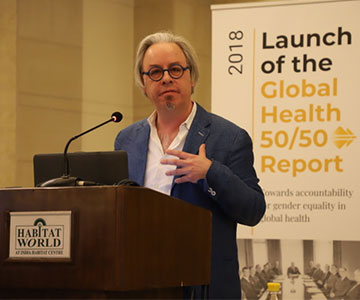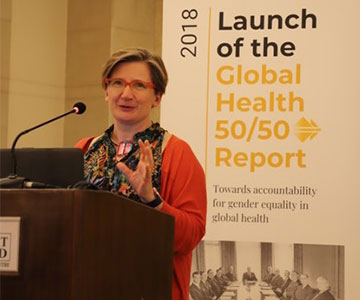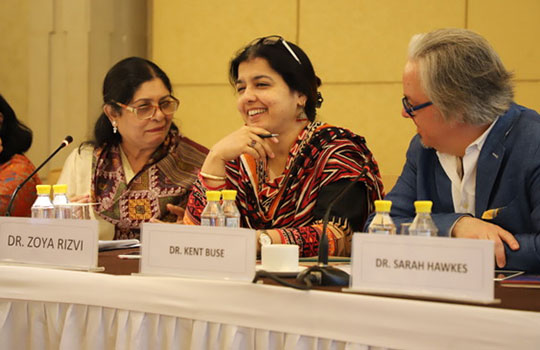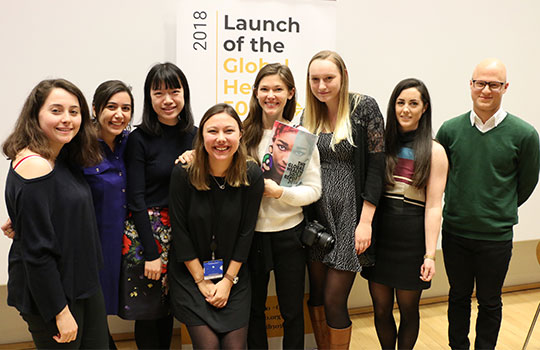All global health organisations need to understand how gender dynamics impact on the health outcomes of both women and men—as well as on their staffing

 For too many decades the issue of gender and gender inequality in global health has been swept under the carpet. It has long been evident that global health is staffed largely by women but run largely by men and that there is a distinctly gendered burden of ill health. The absence of women in leadership positions was occasionally lamented, but rarely acted upon in a systematic way. Moreover, the global health community generally conflated gender to mean “women and girls,” and largely ignored the part that gender plays in driving inequities in health outcomes. It is as if gender has been global health’s dirty little secret.
For too many decades the issue of gender and gender inequality in global health has been swept under the carpet. It has long been evident that global health is staffed largely by women but run largely by men and that there is a distinctly gendered burden of ill health. The absence of women in leadership positions was occasionally lamented, but rarely acted upon in a systematic way. Moreover, the global health community generally conflated gender to mean “women and girls,” and largely ignored the part that gender plays in driving inequities in health outcomes. It is as if gender has been global health’s dirty little secret.
The movements of #SheDecides, #MeToo, and #PayMeToo are having intended and unintended consequences—among them, an unprecedented interest in gender within the realm of global health. After years of observing gender inequality in global health, we decided that the moment was right to launch a new initiative to advance accountability for gender equality—and Global Health 50/50 was born. Our first report examines the gender related policy and practices of 140 global health organisations. It makes for disturbing reading.
Despite the overwhelmingly female composition of the health workforce globally, only 40% of the surveyed organisations have specific measures in place to support women’s careers. It should therefore come as no surprise that the majority of these organisations are run by men. Across the sample, 80% of board chairs, 70% of chief executives, and 75% of organisations have not yet achieved gender parity in senior management. The report makes a series of recommendations to redress this injustice. And it notes that both progress and gender parity are possible, as front running organisations can attest: organisations such as Scaling Up Nutrition and the Rockefeller Foundation have gender balance on their senior management teams, and the Swedish International Development Agency (SIDA) and the Population Reference Bureau have achieved parity on their boards.
A more intractable challenge for global health organisations appears to be how they think about and act on the ways in which gender impacts on the health outcomes of both women and men. Sarah Payne, a professor in health policy and gender, suggests that gender plays a part in three domains:
- Firstly, through the determinants of health and health risks (e.g. the education levels of girls and women are associated with rates of child marriage and early childbearing; while employment in the transport industry leads to men’s higher rates of exposure to death on the roads);
- Secondly, through the attitudes, practices, and gendered expectations placed on people of both sexes in relation to health behaviours (e.g. norms of masculinity are associated with promotion of smoking, alcohol, and low condom use; women’s access to health services may be limited by lack of access to household financial resources); and
- Thirdly, through the provision of health services, which are rarely gender neutral (e.g. transgender people experience high rates of stigma in healthcare settings, which may preclude them from seeking care in the future).
Even a cursory analysis of the data from the Global Burden of Disease Study reveals significant differences in sex-disaggregated health outcomes across disease risks and burdens, and much of this difference is driven by gender. Empirical evidence shows us that men die younger (in every country in the world) and carry a larger burden of ill health in disability adjusted life years (DALY) than women, although women at older ages may suffer higher DALY rates associated with their longer life expectancies.
These inconvenient truths mask an additional reality: these burdens are changing rapidly (particularly as more women smoke, drink alcohol, and take on McJobs). But as the Global Health 50/50 review also finds, only 34% of the 140 organisations surveyed present sex-disaggregated data. This can only reinforce their gender blindness.
We are not calling for a new wave of organisations devoted solely to the health needs of men—that would be just as counterproductive as the status quo. What we are calling for is all global health organisations to understand how gender dynamics impact on their strategy, objectives, target populations, and interventions (as well as on their staffing). This seems to us the only route to achieve the ambitious health related targets established in Agenda 2030—which also seeks to leave no one behind.
Helen Clark, the former prime minister of New Zealand, has argued that Global Health 50/50 serves as a sorely needed accountability platform for global health. We think that certainly can be the case, and hope that by providing data and transparency, we can shine a light on good and poor practice.


Photos: At the launch of the report in India (left) and London (right)
We are pleased to see, for example, that the Swedish International Development Cooperation Agency has used the Global Health 50/50 report in discussions with its senior staff with a view to raising the findings with the global health organisations they currently support. It is, however, up to the boards, leadership, and staff of global health organisations to ultimately decide whether or not they want to bring justice and gender equality into the mainstream of global health or continue to keep it a closeted secret. To help them make that decision we invite you all to join us in making a little noise—rewarding the champions and encouraging the laggards.
Kent Buse is chief, strategic policy directions, UNAIDs. The views in this article do not necessarily reflect those of UNAIDS.
Competing interests: I have read and understood BMJ policy on declaration of interests and declare the following interests: None.
Sarah Hawkes is professor of global Health at University College London. She is also founding director of the Centre for Gender and Global Health at UCL.
Competing interests: I have read and understood BMJ policy on declaration of interests and declare the following interests: None.
Kent and Sarah co-founded Global Health 50/50 in 2017.
